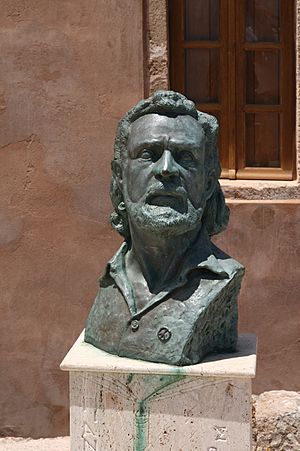Yiannis Ritsos facts for kids
Quick facts for kids
Yiannis Ritsos
|
|
|---|---|
 |
|
| Born | 1 May 1909 Monemvasia, Greece |
| Died | 11 November 1990 (aged 81) Athens, Greece |
| Occupation | Poet |
| Nationality | Greek |
| Literary movement | Modernism Generation of the '30s |
| Notable awards | Lenin Peace Prize 1975 |
| Signature | |
Yiannis Ritsos (Greek: Γιάννης Ρίτσος; May 1, 1909 – November 11, 1990) was a famous Greek poet. He was also a member of the Greek Resistance during World War II. He was known for his strong beliefs and was often called "the great poet of the Greek left."
Contents
Early Life and Challenges
Yiannis Ritsos was born in Monemvasia, Greece, into a wealthy family. However, his childhood was filled with sadness. His mother and older brother died young from a serious illness called tuberculosis. His father also struggled with mental health issues, and the family lost their money. These difficult experiences deeply affected Ritsos and influenced his poems.
From 1927 to 1931, Ritsos himself had to stay in a special hospital for people with tuberculosis.
Becoming a Poet
In 1934, Ritsos joined the Communist Party of Greece. This was a political group that believed in a society where everyone is equal. He made friends with many working-class people. That same year, he published his first collection of poems called Tractor. A well-known poet named Kostis Palamas was very impressed by Ritsos's talent and praised him publicly.
In 1935, Ritsos published another work called Pyramids. Both Tractor and Pyramids tried to show a balance between hoping for a better future and feeling sad about personal struggles. At first, some critics thought his language was too fancy.
A powerful moment inspired his famous poem Epitaphios. In May 1936, he saw a photo of a dead protester during a large workers' demonstration. He wrote Epitaphios that same year. This poem was different from traditional Greek poetry. It used simple words to share a message about people coming together.
Poetry and Politics
In August 1936, a new government came to power in Greece. It was a dictatorship led by Ioannis Metaxas. A dictatorship is a type of government where one person or a small group has all the power and doesn't allow people much freedom. Because of Ritsos's political ideas, his poem Epitaphios was publicly burned in Athens.
After this, Ritsos changed his writing style. He started exploring surrealism, which is an art movement that uses dreams and surprising ideas. His poems from this time, like The Song of my Sister (1937) and Symphony of the Spring (1938), showed his feelings of worry and his memories.
War, Civil War, and Imprisonment
During World War II, Greece was taken over by other countries. Ritsos joined the National Liberation Front (EAM), a group that fought against the occupation. He wrote many poems for the Greek Resistance, which was the movement of people fighting for their country's freedom.
After World War II, Greece had a Civil War (1946-1949). Ritsos supported the left-wing side. In 1948, he was arrested and spent four years in prison camps. In the 1950s, his poem Epitaphios was set to music by Mikis Theodorakis and became a very important song for the Greek left.
In 1967, Ritsos was arrested again by a new military government, known as the Papadopoulos dictatorship. He was sent to different prison camps, including Gyaros, Samos, and Lemnos.
His Lasting Impact

Today, Yiannis Ritsos is seen as one of the most important Greek poets of the 20th century. Other famous poets like Konstantinos Kavafis and Giorgos Seferis are also in this group. The French poet Louis Aragon even called Ritsos "the greatest poet of our age." Pablo Neruda, another famous poet, believed Ritsos deserved the Nobel Prize for Literature more than he did. Ritsos was suggested for the Nobel Prize nine times but never won. When he received the Lenin Peace Prize in 1975, he said it was more important to him than the Nobel.
Because of his political beliefs, his poetry was sometimes banned in Greece.
Some of his well-known works include Pyramids (1935), Epitaphios (1936), Romiosini (1954), and 18 short songs of the bitter Motherland (1973). Epitaphios is still his most famous work.
Ritsos won the first Greek state poetry award for his poem Moonlight Sonata:
I know that each one of us travels to love alone,
alone to faith and to death.
I know it. I've tried it. It doesn't help.
Let me come with you.
Some people have different opinions about his work. While many praise his power, others suggest that some of his poems read more like short stories. However, his ability to write with great strength is clear in poems like "Romiosini," which celebrates the spirit of the Greek Resistance.
Ritsos also received the Golden Wreath Laureate award at the Struga Poetry Evenings in 1985. His daughter, Eri, later became involved in politics, running for the European Parliament in 2014.
See also
 In Spanish: Yannis Ritsos para niños
In Spanish: Yannis Ritsos para niños

